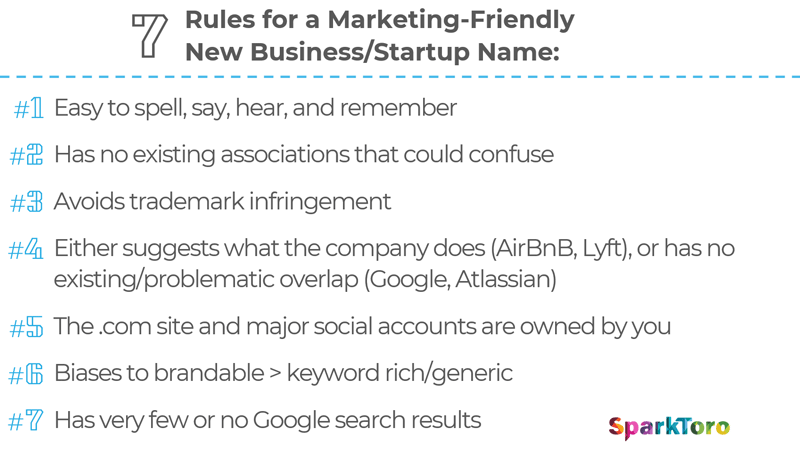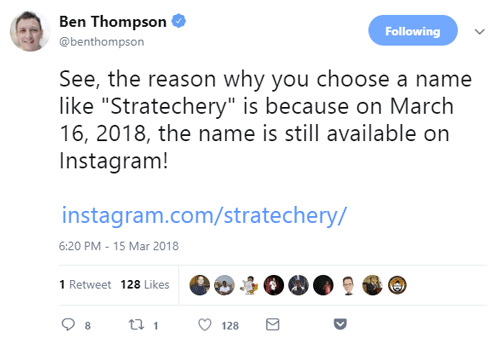A few months ago, I settled on a name for my new company. Since the launch two weeks ago, I’ve received the question, “why SparkToro?” a few dozen times. Unlike my prior entrepreneurial venture (in which I started with the very awkward SEOmoz.org, and later rebranded to Moz.com), I was far more thoughtful and intentional this time around. And since one of my big missions is to help people do better marketing, I couldn’t think of a better time to tackle what can be a thorny subject.
What priorities matter when choosing a name for your new business or project? Something you personally like? A name that makes what you do obvious? Do names even matter all that much?
Do Names Matter?
Let’s tackle this topic first. If your goal is to maximize your short and long-term odds of survival and success, the name you select should be designed to have the biggest impact on one area of your company: Marketing.
You want a name that:
- Once heard, is remembered
- Doesn’t get confused with something or someone it’s not
- Has high processing fluency (meaning it’s cognitively easy for people to think and talk about)
- Won’t negatively impact potential reach or use
A contrarian could reasonably argue that many names which do a terrible job of these have turned into successful businesses. Amazon (which was obviously a river for a long time before the company launched). Xero (which I’m actually still not clear on how to pronounce). Virgin (which means… something else). Dairy Queen (seems like there must be a relation to Burger King, right?). Hachette (not exactly easy to pronounce). Every single law firm partnership (Something, Someone, and Someone Else… I think one of them starts with an “S”).
When we talk about optimizing to reduce marketing friction, it can be valuable to ask “is there something in these names that made them work better?” but it’s not productive to get wrapped up in survivorship bias. There are hundreds of factors that go into a company’s survive-ability and success. A name is only one. But it’s also entirely in your control. So why not give your new venture the best possible odds with a name that meets a few, marketing-friendly criteria?
There’s some interesting research to back up the importance of brand names, including stock prices of companies with easier-to-pronounce names perform better (don’t let anyone tell you “the market doesn’t have human biases”), words build up implicit associations that can bias perception (and behavior), and (perhaps most saliently for startups) simpler names correlated with higher odds of staying alive among early-stage companies, even when controlling for many other variables.
Do You Need to Like Your Company’s Name?
It’s not a bad idea. You’ll certainly live with it (hopefully) a long time, and need to say it an awful lot. Choosing a name that fits the criteria for marketing ease that make you recoil in regret each time you need to type it or share it is definitely a bad idea. But I wouldn’t suggest aiming for something you absolutely love.
Why not? Because it usually biases you to choose something personally enjoyable over something that’s going to add value to the entity. My advice is to start by coming up with names that meet the criteria, and only *then* choose your favorite one. In this way, you limit the risk of falling in love with a name that resonates personally, but performs poorly on the important tests below.
7 Rules for a Marketing-Friendly Startup Name
My personal checklist (which encompasses much of the other new company naming advice out there) has the following:
- Easy to spell, say, hear, and remember
Words that *sound* like real words or are unusual combinations of existing words are good targets for this, so long as they aren’t difficult to spell or pronounce. Try asking 10 random people to say the word after showing them the written-down version and another 10 people to spell the word after hearing you say it. If 90%+ nail it, you’re good to go. - Has no existing associations that could confuse
The name shouldn’t trigger any other pre-existing mental connections, or call to mind a brand, company, product, or idea that you don’t intentionally want harness, e.g. it’s fine to name your company something like “Pastaboard” if you want an association with the food, but a terrible idea if you don’t. - Avoids trademark infringement
This one’s easy. The US Patent Office maintains a database of searchable names online. Use it before you start (unless you’re buying an existing domain name and the site owner is willing to also sell you the TM) - Suggests what the company does, or has no existing/problematic overlap
If your company’s name calls to mind the problem you help solve or the product you offer, great (AirBnB, Lyft, Mythbusters). If it calls to mind nothing at all (Google, Atlassian, SparkToro), that’s great too. But if the name reminds people of something that the company doesn’t intend or want to be associated with, that’s bad. - The .com site and major social accounts are owned by you
I can’t tell you how many entrepreneurs I know who’ve spent weeks over the early life of their companies worried about and working to obtain the .com domain name, Twitter account, Facebook page, Instagram account, etc. For some new businesses, the social account names matter less, but for almost every business (at least those based in the US, targeting English-language speakers), the .com domain is still the assumption many, many customers, visitors, and potential amplifiers will use. This problem can be particularly pernicious if a domain holder chooses to act competitively, in bad faith, or is simply better at SEO than you are. - Biases to brandable > keyword rich and generic
Too literal is a problem many domain names on the web face, and because over the past 20 years, consumers have come to associate these keyword-driven names with sketchy, spammy operators (often due to the first decade of SEO practices), behavior biases against them. They’re also really, really hard to build resonant offline brands around. Just compare a name like Wirecutter or C|Net vs. ElectronicsReviews or LCD-TV-Comparisons. In those cases, the name is a literal brand killer. There are perhaps a few dozen of these keyword-rich, generic names that have ever achieved brand status (CheapFlights and Pets.com are the only two that come to mind). - Has very few or no Google results
This litmus test is gold. Not only does it prevent a lot of the other problems (usually, at least, avoiding trademark infringement and increasing the odds that the social accounts and .com domain are available), it also makes it incredibly easy to track your new company’s brand mentions across the web. Setting up a Google Alert, Fresh Web Alert, or Mention Alert and observing with high accuracy who’s talking about you when is a cheat code for improving your outreach and your marketing analytics. Just make sure to search in quotes, e.g. when I did it for this site, I checked “SparkToro” not just SparkToro.
Want that as a visual checklist you can put in a slide deck or copy/paste into a tweet? (I know I always like those — they reduce, you guessed it, marketing friction!) Here you go:

There’s a larger version available for download here, too.
What If My Name Misses A Few Criteria?
Of course, you don’t have to nail every aspect. Many names come with drawbacks and positives. For me, SparkToro is a syllable more and 2-3 characters longer than a perfectly ideal name. But I was willing to sacrifice those in exchange for a name with zero Google results (when queried in quotes prior to Feb. 28, 2018) and every other aspect I wanted (plus I really like the cartoon, Totoro, and the sushi made from fatty tuna belly, otoro).
Tons of successful companies have gotten by with mediocre names, and many have leveraged their strengths in certain arenas to overcome weaknesses in others (e.g. A16Z in venture capital turned their hard-to-spell combination of last names into a clever, short, memorable acronym). There’s even anecdotal data suggesting that nicknaming longer or more convoluted names may have a positive processing fluency impact.
Ben Thompson noted a strength (uniqueness) of his brand’s hard-to-pronounce-and-spell name on Twitter:

If you’ve got additional naming criteria for new companies, I’d love to hear about it in the comments 🙂
